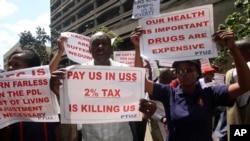HARARE (Reuters) - Zimbabwe’s public workers have accepted a 29 percent salary hike for the lowest paid employees, which the government says will cushion them against double-digit inflation, unions said on Thursday, and likely averting a strike in the interim.
Civil servants in the southern African nation twice rejected a lower government wage offer in January but had been divided over a strike, which led to teachers briefly walking out of their jobs.
Zimbabwe is gripped by a severe U.S. dollar crunch, causing shortages of fuel, food and medicine and dashing hopes among citizens that the economy will quickly recover after years of sputtering under Robert Mugabe, who was removed after a coup in 2017.
An agreement signed by the government and the top public workers’ union Apex Council said “a cost of living adjustment of $400 million (will) be effected across the board for all members of the public service with effect from 1 April.”
That means the lowest paid worker will now earn a monthly gross salary of $570 from $441, said an official from Apex Council, which represents 16 public sector unions.
Zimbabwe’s central bank last month ditched a discredited 1:1 dollar peg for its surrogate bond notes and electronic dollars and merged them into a lower-value transitional currency called the RTGS dollar.
Public workers would also be able to import vehicles without paying import duty and the government will provide buses to transport the workers, the agreement said.
Analysts say wage pressures could see inflation accelerate, but Finance Minister Mthuli Ncube has said any salary increases would be within its $8 billion budget for 2019.
Ncube said this week he expected the annual inflation rate to fall to below 10 percent by the end of the year from 59.39 percent in February because the government would cut its budget deficit by half. (Reporting by MacDonald Dzirutwe; Editing by Kim Coghill)




